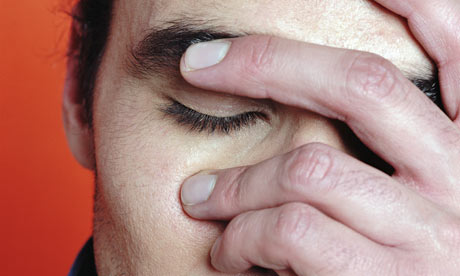
Imagine the worst hangover you've have ever had. Well, that's the best way I can describe the feeling waking up every day when you have kidney failure. But without the fun part of getting drunk first – and sadly, nor does a fry-up make it any better.
The feeling comes from the build-up of toxins in my blood, similar to too much alcohol. The millions of tiny nephrons in my kidney that filter out the bad stuff have been destroyed by an auto-immune disease. So my blood has become a ghastly stew of waste products, which cause nausea and headaches and general all-round wretchedness.
A simple measurement of how well kidneys are working is the level of creatinine in the blood. Creatinine is a waste product produced by muscles and got rid of through the kidneys. A "normal" level depends on how much muscle you have, so a child's will be around 60 while a bodybuilder's will be as high as 130. Mine is currently around 700 and getting higher. The only thing that is going to bring it down permanently is another transplant.
Last week, I saw my brilliant consultant, Professor John Cunningham, at the Royal Free in Hampstead, London. He and his team are helping to put my mind at rest about my wife Rachel being a potential kidney donor for me. As I have already described, I have serious reservations about her going through this.
When my brother donated one of his kidneys to me eight years ago, he was left with a 10-inch scar on the right side of his torso that wouldn't look out of place in a gallery of shark attack pictures. I couldn't bear to put Rachel through the same amount of pain.
The Prof told me that kidney removals are now much less invasive. The surgery is done laparoscopically, with small cameras inserted into the donor, and then the kidney removed through an incision in the lower abdomen. My brother was laid up for three months after the operation, whereas Rachel could be out of hospital in three days and
back at work in six weeks. Rachel met with Alison, the sister from the live donor team, who talked her through the process ahead.
It starts with a blood test. This will check whether our respective blood groups are compatible and, most importantly, whether or not I have antibodies that will react against her kidney and cause my body to reject the transplant.
After this, there will be a whole round of scans, x-rays and tests. The hospital will check the strength of both her kidneys separately to make sure that if she is left with just one, it will cope on its own.
She will also have to see an independent doctor to check she isn't being paid to donate or making the choice under duress. I took my brother away for a holiday to the south of France after he gave me his kidney – Rachel is demanding at least the same, if not better. Does that count as a financial inducement? Maybe she shouldn't mention it, just in case.
Uncomfortable as I still am about Rachel donating, I know I am lucky that I have this option at the moment, as well as the national transplant list. If I only had the list to rely on, I wouldn't fancy my chances. Three people die every day in the UK waiting for transplants.
The grim reality of the transplant list was brought home to me this weekend when I saw a friend whose father also needs a kidney transplant. Earlier that week, he had been called in by the hospital as a cadaveric kidney had become available and if it was a match, they would do the surgery straight away. A transplant would have completely changed his life. In the end, the kidney wasn't good enough to be transplanted and after a few hours of hope, he went home again to life on dialysis, hoping another call will come soon.
If Rachel can't donate, then I will also be waiting for that call, never going too far from the hospital, never knowing when I might get my life back. Or worse, if it will be too late.
• This week is National Transplant Week. You can find out more about the campaign and join the organ donor register here.

